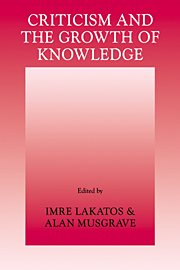 Criticism and the Growth of Knowledge
Criticism and the Growth of Knowledge Published online by Cambridge University Press: 05 August 2014
‘I have been hanging people for years, but I have never had all this fuss before.’ (Remark made by Edward ‘Lofty’ Milton, Rhodesia's part time executioner on the occasion of demonstrations against the death penalty.) ‘He was’—says Time Magazine (15 March 1968)—‘professionally incapable of understanding the commotion.’
Introduction.
Ambiguity of presentation.
Puzzle solving as a criterion of science.
Function of normal science.
Three difficulties of functional argument.
Does normal science exist?
A plea for hedonism.
An alternative: the Lakatos model of scientific change.
The role of reason in science.
INTRODUCTION
In the years 1960 and 1961 when Kuhn was a member of the philosophy department at the University of California in Berkeley I had the good fortune of being able to discuss with him various aspects of science. I have profited enormously from these discussions and I have looked at science in a new way ever since. Yet while I thought I recognized Kuhn's problems; and while I tried to account for certain aspects of science to which he had drawn attention (the omnipresence of anomalies is one example); I was quite unable to agree with the theory of science which he himself proposed; and I was even less prepared to accept the general ideology which I thought formed the background of his thinking. This ideology, so it seemed to me, could only give comfort to the most narrowminded and the most conceited kind of specialism.
To save this book to your Kindle, first ensure no-reply@cambridge.org is added to your Approved Personal Document E-mail List under your Personal Document Settings on the Manage Your Content and Devices page of your Amazon account. Then enter the ‘name’ part of your Kindle email address below. Find out more about saving to your Kindle.
Note you can select to save to either the @free.kindle.com or @kindle.com variations. ‘@free.kindle.com’ emails are free but can only be saved to your device when it is connected to wi-fi. ‘@kindle.com’ emails can be delivered even when you are not connected to wi-fi, but note that service fees apply.
Find out more about the Kindle Personal Document Service.
To save content items to your account, please confirm that you agree to abide by our usage policies. If this is the first time you use this feature, you will be asked to authorise Cambridge Core to connect with your account. Find out more about saving content to Dropbox.
To save content items to your account, please confirm that you agree to abide by our usage policies. If this is the first time you use this feature, you will be asked to authorise Cambridge Core to connect with your account. Find out more about saving content to Google Drive.